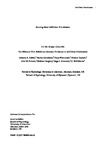It’s not always about me: The effects of prior beliefs and stimulus prevalence on self–other prioritisation
| dc.contributor.author | Falbén, JK | en |
| dc.contributor.author | Golubickis, M | en |
| dc.contributor.author | Wischerath, D | en |
| dc.contributor.author | Tsamadi, D | en |
| dc.contributor.author | Persson, LM | en |
| dc.contributor.author | Caughey, S | en |
| dc.contributor.author | Svensson, SL | en |
| dc.contributor.author | Macrae, CN | en |
| dc.date.accessioned | 2020-04-22T12:59:37Z | |
| dc.date.available | 2020-04-22T12:59:37Z | |
| dc.date.issued | 2020-04-15 | en |
| dc.identifier.issn | 1747-0218 | en |
| dc.identifier.uri | http://hdl.handle.net/10026.1/15591 | |
| dc.description.abstract |
<jats:p> Although self-relevance is widely acknowledged to enhance stimulus processing, the exclusivity of this effect remains open to question. In particular, in commonly adopted experimental paradigms, the prioritisation of self-relevant (vs. other-relevant) material may reflect the operation of a task-specific strategy rather than an obligatory facet of social-cognitive functioning. By changing basic aspects of the decisional context, it may therefore be possible to generate stimulus-prioritisation effects for targets other than the self. Based on the demonstration that ownership facilitates object categorisation (i.e., self-ownership effect), here we showed that stimulus prioritisation is sensitive to prior expectations about the prevalence of forthcoming objects (owned-by-self vs. owned-by-friend) and whether these beliefs are supported during the task. Under conditions of stimulus uncertainty (i.e., no prior beliefs), replicating previous research, objects were classified more rapidly when owned-by-self compared with owned-by-friend (Experiment 1). When, however, the frequency of stimulus presentation either confirmed (Experiment 2) or disconfirmed (Experiment 3) prior expectations, stimulus prioritisation was observed for the most prevalent objects regardless of their owner. A hierarchical drift diffusion model (HDDM) analysis further revealed that decisional bias was underpinned by differences in the evidential requirements of response generation. These findings underscore the flexibility of ownership effects (i.e., stimulus prioritisation) during object processing. </jats:p> | en |
| dc.format.extent | 174702182091301 - 174702182091301 | en |
| dc.language | en | en |
| dc.language.iso | en | en |
| dc.publisher | SAGE Publications | en |
| dc.title | It’s not always about me: The effects of prior beliefs and stimulus prevalence on self–other prioritisation | en |
| dc.type | Journal Article | |
| plymouth.journal | Quarterly Journal of Experimental Psychology | en |
| dc.identifier.doi | 10.1177/1747021820913016 | en |
| plymouth.organisational-group | /Plymouth | |
| plymouth.organisational-group | /Plymouth/Faculty of Health | |
| plymouth.organisational-group | /Plymouth/Faculty of Health/School of Psychology | |
| plymouth.organisational-group | /Plymouth/REF 2021 Researchers by UoA | |
| plymouth.organisational-group | /Plymouth/REF 2021 Researchers by UoA/UoA04 Psychology, Psychiatry and Neuroscience | |
| plymouth.organisational-group | /Plymouth/REF 2021 Researchers by UoA/UoA04 Psychology, Psychiatry and Neuroscience/UoA04 Psychology, Psychiatry and Neuroscience MANUAL | |
| plymouth.organisational-group | /Plymouth/Users by role | |
| plymouth.organisational-group | /Plymouth/Users by role/Academics | |
| dcterms.dateAccepted | 2020-02-24 | en |
| dc.rights.embargodate | 2020-07-03 | en |
| dc.identifier.eissn | 1747-0226 | en |
| dc.rights.embargoperiod | Not known | en |
| rioxxterms.versionofrecord | 10.1177/1747021820913016 | en |
| rioxxterms.licenseref.uri | http://www.rioxx.net/licenses/all-rights-reserved | en |
| rioxxterms.licenseref.startdate | 2020-04-15 | en |
| rioxxterms.type | Journal Article/Review | en |


